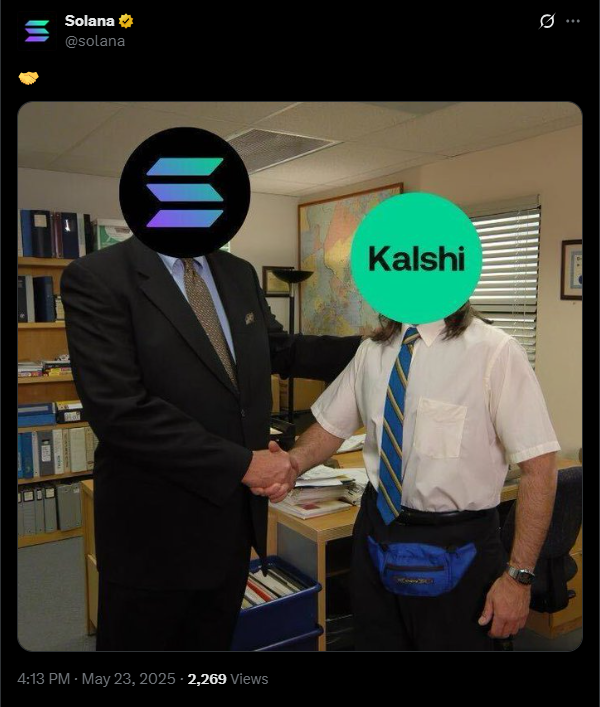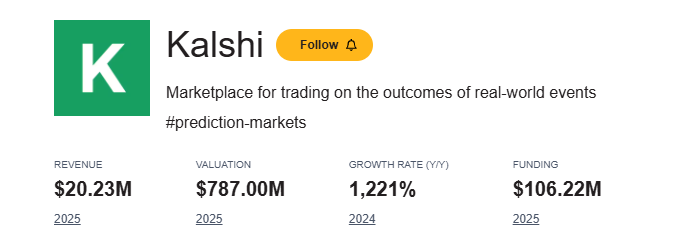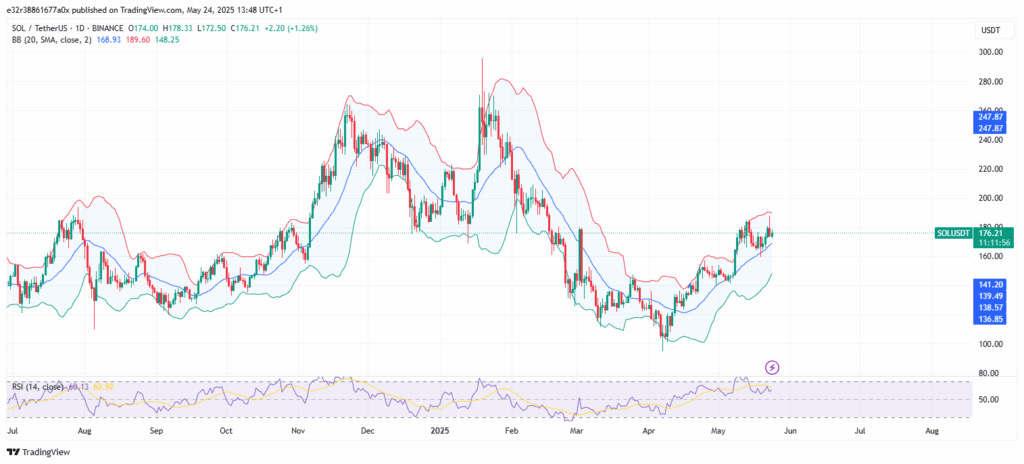Key Insights:
- US-regulated prediction market Kalshi now directly accepts Solana (SOL) deposits.
- This integration allows SOL holders to participate in event predictions without having to convert to and from fiat.
- Solana’s price is showing bullish indicators and is pushing towards the $200 mark.
Solana has always been praised for its speed and low transaction costs. However, until recently, its real-world use cases had been fairly narrow.
Most of its network activity spanned around DeFi and speculative meme coin trading. However, a new development could be what makes all the difference and expand Solana’s use cases beyond speculation.
Kalshi, a U.S.-regulated prediction market platform, has officially introduced Solana (SOL) deposits. This move creates several new ways for SOL holders to participate in real-world event predictions, without needing to convert to stablecoins or fiat. Here’s what this means for Solana and the crypto space as a whole.
Kalshi Now Accepts SOL
Kalshi is one of the biggest prediction markets based in the United States. Just like PolyMarket, it allows users to bet on real-world events like election outcomes, weather events, or even entertainment milestones.

Think of it as a platform where you can put your money on whether the next U.S. president will be a Democrat or Republican, or whether Grand Theft Auto VI will be released this year.
Until now, users had to convert crypto into fiat or stablecoins before using Kalshi. That added some friction and likely discouraged many crypto-native users. However, with SOL now accepted directly alongside Bitcoin, USDC, and Worldcoin, Solana holders can fund their Kalshi accounts instantly. More importantly, this isn’t just a minor payment integration. It is part of a bigger change in how SOL can be used.
From Speculation to Real Utility
Solana has seen massive trading activity over the last few years, especially from the memecoin market.
For example, May alone saw meme tokens account for roughly 65% of Solana’s total trading volume. While this speculative wave has contributed to the network’s overall usage, it hasn’t necessarily pointed towards long-term utility.
As it stands, Kalshi’s new support for SOL opens the door to more grounded means of using the network. Solana can now power predictions based on real-world events, which tend to require aspects like research, analysis, and genuine user conviction.
All of the above factors set Solana up as not just a speculative asset, but as a tool for change.
By aligning itself with prediction markets, Solana has now set itself up for becoming a major part of “decentralized knowledge exchange”.
Why This Matters for Liquidity
Liquidity is a very important part of any cryptocurrency’s success. From Bitcoin to Ethereum to XRP (and even fiat), liquidity influences everything from ease of trading to price stability.
The Kalshi integration creates a new flow of movement for SOL. One that could massively boost its liquidity. One major reason why this is good news for Solana is that instead of sitting idle in wallets or getting locked in meme coin positions, Solana now has some practical utility on Kalshi.
This is expected to make a major difference in terms of its price. Moreover, users’ funding, settling, and withdrawing from Kalshi using SOL is expected to drive more on-chain transactions.
In addition, the cycle of engagement is likely to become more rounded because when users close a contract on Kalshi, their funds return to their wallets. These funds can then be reused within the Solana network as the cycle of activity continues.
In addition, Kalshi has partnered with Zero Hash to allow smooth conversions between SOL and USD. This backend setup is expected to remove the need for users to take more steps than necessary. More and more users will find it easier to adopt both Kalshi and Solana.
Could This Attract New Users?
This merger is expected to attract even more people, especially users who value fast settlement, low fees, and user-friendly processes. Solana’s speed (and new use cases) could be a major win for both.
It is worth mentioning that Kalshi has also been growing very quickly, especially with the US presidential elections in 2024.
During the year, the platform reported $1.97 billion in trading volume, which was a long way up from just $183 million the previous year.

The platform has support in over 40 U.S. states and is therefore well set to attract more attention. Solana being part of the mix lets the network tap into this growing user base.
Solana’s Price Could Show This Change
Market sentiment appears to be catching on. As of late May, Solana was trading at around $176 and pushing towards the psychological $200 mark.

Moreover, technical indicators are showing signs of a bullish setup. For example, the 20-day EMA has crossed above the 50-day and 100-day EMAs, which is a signal that is often associated with positive momentum.
If Solana manages to break above its 200-day EMA, a stronger move towards the $200 zone and beyond could be in the cards. In short, Kalshi’s integration may not just improve fundamentals for SOL, it could also help to fuel a price movement to the upside.
